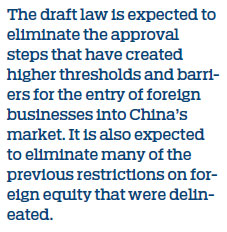Draft law to further facilitate investment
Topping the agenda at the National People's Congress annual session this week will be the question of adopting a new law for foreign investment. The unified law will replace the three existing laws on Chinese-foreign equity joint ventures, wholly foreign-owned enterprises and Chinese-foreign contractual joint ventures. Which makes me feel nostalgic, as I was one of the early "China trade lawyers" to travel across the country in the 1980s and 1990s to negotiate joint venture deals to bring multinationals into China's market.
China's foreign investment legislation has developed piecemeal over the past four decades, beginning with the first law on Chinese-foreign joint ventures adopted by the NPC in 1979, when China was just beginning to open its doors to foreign investment, and foreign investors had little understanding of the Chinese market. Many foreigners did not know how to cope with China's complex system of approvals involving crossover sector permissions from different ministerial or administrative bodies. And Chinese factories did not know how to adapt to foreign management.

From the 1980s onwards, China adopted a gradual, sequenced approach to everything, from economic development to law. The first joint venture law was simple, though initially it was vague on many issues, which at that time remained unknown to Chinese and foreign investors alike. Gradually, when there were enough examples of real joint ventures, the lawmakers looked at these contracts, prepared the salient points, and adopted and implemented regulations.















